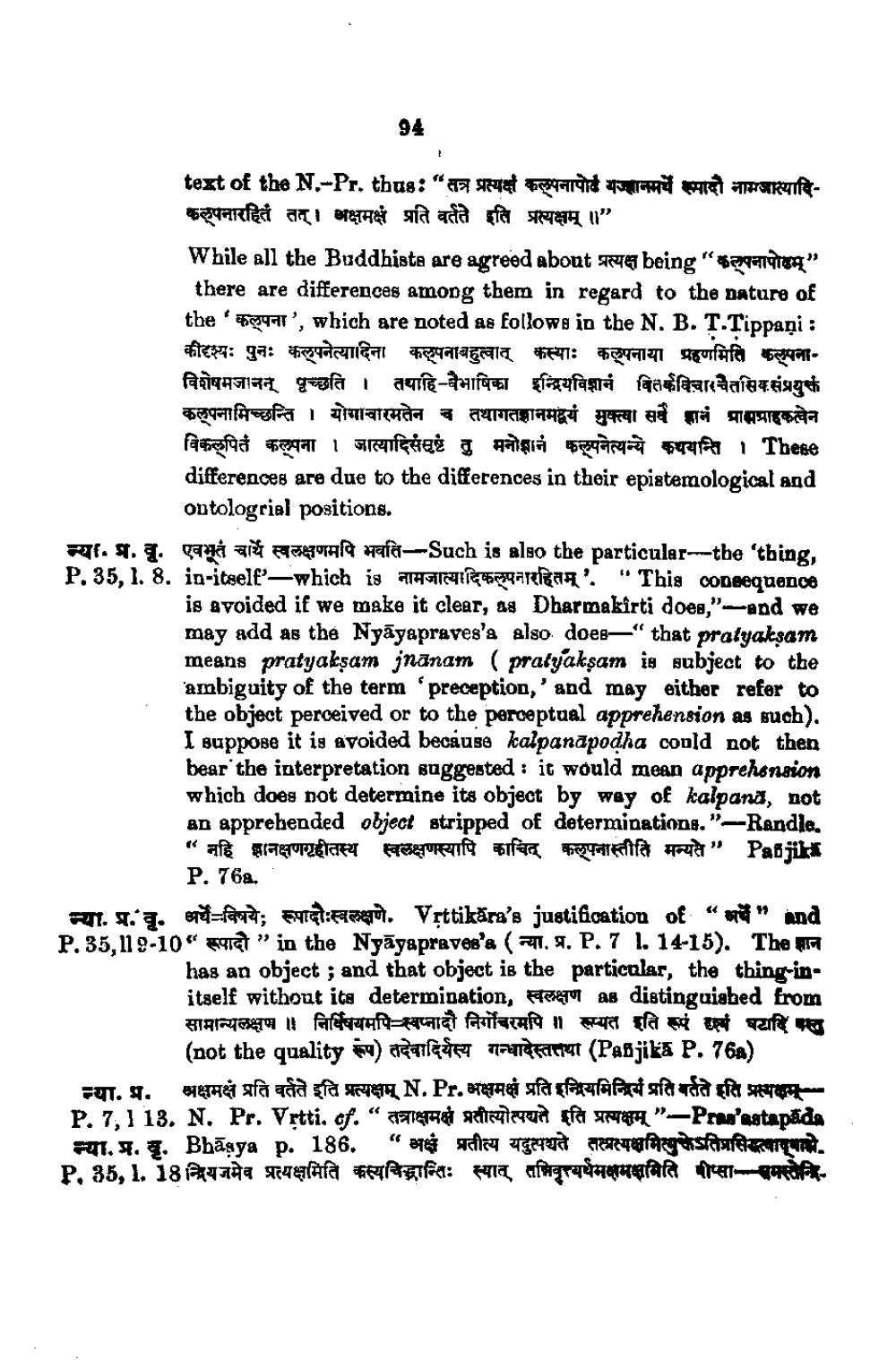________________
94
text of the N.-Pr. thus: "सत्र प्रत्यक्ष कल्पनापोते यजानमय स्मादी नामजात्यादिकल्पनारहितं तत् । अक्षमक्षं प्रति वर्तते इति प्रत्यक्षम् ॥" While all the Buddhiste are agreed abont प्रत्यक्ष being "कल्पनापोडम्" there are differences among them in regard to the nature of the ' कल्पना', which are noted as follows in the N. B. T.Tippani: कीदृश्यः पुनः कल्पनेत्यादिना कल्पनाबहुत्वात् कस्याः कल्पनाया प्रहणमिति कल्पना. विशेषमजानन् पृच्छति । तथाहि-वैभाषिका इन्द्रियविज्ञानं वितर्कविचार चेतसिकसंप्रयुक्त कल्पनामिच्छन्ति । योगाचारमतेन च तथागतज्ञानमद्वयं मुक्त्वा सर्व झानं प्रामप्राहकलेन विकल्पितं कल्पना । जात्यादिसंसृष्टं तु मनोमानं कल्पनेत्यन्ये कथयन्ति । These differences are due to the differences in their epistemological and
ontologrial positions. न्या.प्र.व. एवभूतं चाथै स्वलक्षणमपि भवति-Such is also the particular---the thing, P.35, 1. 8. in-itself-which is नामजात्यादिकल्पनारहितम् '. " This consequence
is avoided if we make it clear, as Dharmakirti does."-and we may add as the Nyāyapraves's also does—" that pratyaksam means pratyakşam jnanam (pratyakşam is subject to the ambiguity of the term 'preception,' and may either refer to the object perceived or to the perceptual apprehension as such). I suppose it is avoided because kalpanapodha could not then bear the interpretation suggested : it would mean apprehonsion which does not determine its object by way of kalpand, not an apprehended object stripped of determinations. "--Randle. " नहि ज्ञानक्षणगृहीतस्य स्वलक्षणस्यापि काचित् कल्पनास्तीति मन्यते" Panjirs
P.76a. न्या. प्रवृ. अर्थ-विषये; रूपादौःस्वलक्षणे. Vrttikara's justification of “अ " and P.35,12-10" रूपादौ " in the Nyayapraves'a (न्या. प्र. P.7 1. 14-15). The ज्ञान
has an object; and that object is the particular, the thing-initself without ita determination, so as distinguished from सामान्यलक्षण ॥ निर्विषयमपि स्वप्नादौ निर्गोचरमपि ॥ रूप्यत इति स्पं हवं घटादि पस्तु
(not the quality रूप) तदेवादिर्यस्य गन्धादेस्तत्तथा (Panjika P. 768) न्या.प्र. सक्षमक्ष प्रति वर्तते इति प्रत्यक्षम् N. Pr.भक्षमक्ष प्रति इन्द्रियमिन्द्रिय प्रतिवर्तते इति प्रत्यक्षम P. 7,113. N. Pr. Vrtti.of. “ तत्राक्षमझ प्रतीत्योत्पद्यते इति प्रत्यक्षम् "-Prna'estapada
न्या. प्र.व. Bhasya p. 186. “भक्षं प्रतीत्य यदुत्पद्यते तत्त्रत्यक्षमित्युकेऽतिप्रसिदत्वावधाो. P.35, 1. 18 न्द्रियजमेव प्रत्यक्षमिति कस्यचिद्धान्तिः स्यात् तनिवृत्यर्थमक्षमक्षामिति पीप्सा-मस्सेनि




